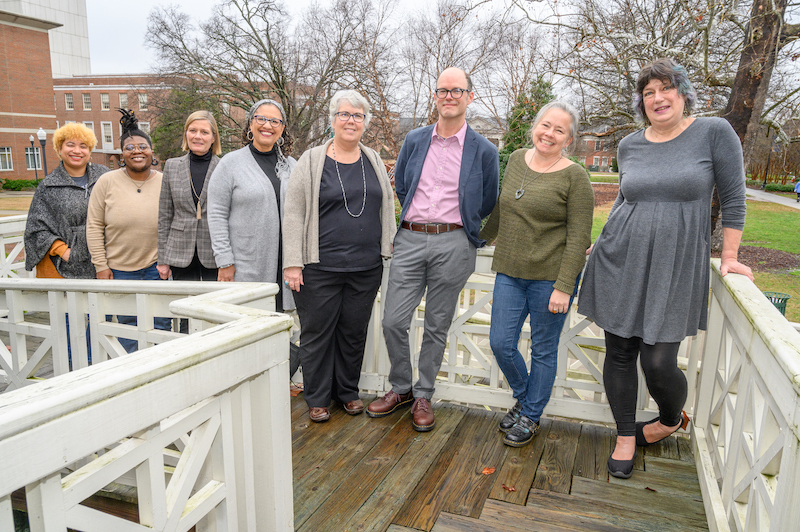Posted on January 17, 2020

L to R: Cherizar Crippen, Holden Cession (both with How We are Free), Paula Sieber, Deborah Barnes (both with Peacemaker Collaborative and Urban Farm), Beth Sheffield (Learning Circles, Greensboro Library), Glenn Perkins (Democracy Tables, Greensboro History Museum), Kathy Newsom and Liz Seymour (Growing Green for Greens, Neighborhood Markets)
Five innovative Greensboro-area community organizations have just received special recognition and funding support from UNCG, the first of its kind from the University.
UNCG’s Department of Communication Studies, the host institution for the National Communication Association’s Center for Communication, Community, Collaboration, and Change (CCCC), has awarded a total of $20,000 for programming and research to five Greensboro-based community organizations for the 2020-2021 school year. The programs advance the theme “Cultivating Resilient Communities” by featuring vibrant citizen participation that focuses on improving the lives of people in Greensboro, making explicit connections to communication, and offering ample opportunities for curricular and student partnerships.
UNCG’s deep roots in community engagement have led to the first-ever grant, which will support (financially and with research) community groups that are engaged in social justice-based work to uplift under-resourced members of the community. Researchers will evaluate programs and perform research on how communication influences, shapes, and leads change of lasting impact.
Vice Chancellor for Research and Engagement Dr. Terri Shelton and Dean of the College of Arts and Sciences Dr. John Kiss were attendance at the award ceremony in the Faculty Center on January 13.
“You can see lots of connections between these projects and the way in which people are thinking about communication, community, and change. Democracy, sustainability, justice – these are really core commitments for us, and this is an opportunity to really exercise some of these skills, sensibilities of compassion, and empathy so that we can really make some change and impact in our community that continues to evolve and grow,” said Professor of Communication Studies Dr. Spoma Jovanovic.
The five community organizations that were recognized include:
Growing Green for Greens (Neighborhood Markets, Inc.)
The Green for Greens program enables customers at two of Greensboro’s local farmer’s markets to purchase healthy, locally-grown food using SNAP/EBT. Using a token-based system, customers can double the dollar amount of SNAP-approved foods that they can purchase, allowing their limited funds to go twice as far. The program is supported by donations from individuals, churches, and other local institutions. The grant from CCCC will allow the program to develop a more sustainable donor network and expand the awareness of the program, reaching more families who experience food insecurity.
Democracy Tables: An Experiment in Community Connection (Greensboro History Museum)
Democracy Tables are a series of facilitated discussions designed to attract city residents, particularly those from traditionally underrepresented communities, into dialogues on locally-based issues and concerns. Participants will explore collaborative processes to understand the diversity of experiences among city residents and how people can connect to government mechanisms that support change. The project seeks to involve a multi-generational cross-section of Greensboro.
Greensboro Learning Circles: Journeys into Knowledge (Greensboro Public Library)
In an increasingly digital world, members of marginalized communities often find themselves lacking the resources to truly benefit from all the knowledge opportunities that are available online. Learning Circles will bring together members of the community who are participating in online study courses to provide peer support and to help them navigate the digital world. Participants will have a space to meet and access to the internet in order to take online courses and receive technical support. Support from peers and facilitators is designed to motivate participants to further pursue online educational opportunities and improve their use of digital tools.
The Peacemaker Collaborative & Urban Farm Project
This initiative addresses food insecurity through community engagement, partnership development, and sustainable practices. Nearly four acres of donated property will be transformed into a local urban farm to provide area residents access to healthy foods, as they learn about local agriculture issues, training and workforce development opportunities, and available entrepreneurial activities. The farm plans to provide 1,056 families with fresh produce at little or no cost while encouraging innovation and resilience among families of need in the community.
How We Get Free
How We Get Free is a series of conversations and gatherings focused on exploring the needs, dreams, and aspirations of Black youth in Greensboro. These conversations will operate as a location for young Black people to bring their knowledge, experiences, and visions together for the future. Activities such as small group discussions, art-making, and role-playing will help participants break down various barriers – including age, gender, and sexuality – in order to cultivate a space for engagement and dialogue surrounding systemic oppression, and to craft strategies that empower communities for a brighter future.
[This entry was posted in CW, Features. Bookmark the permalink.]